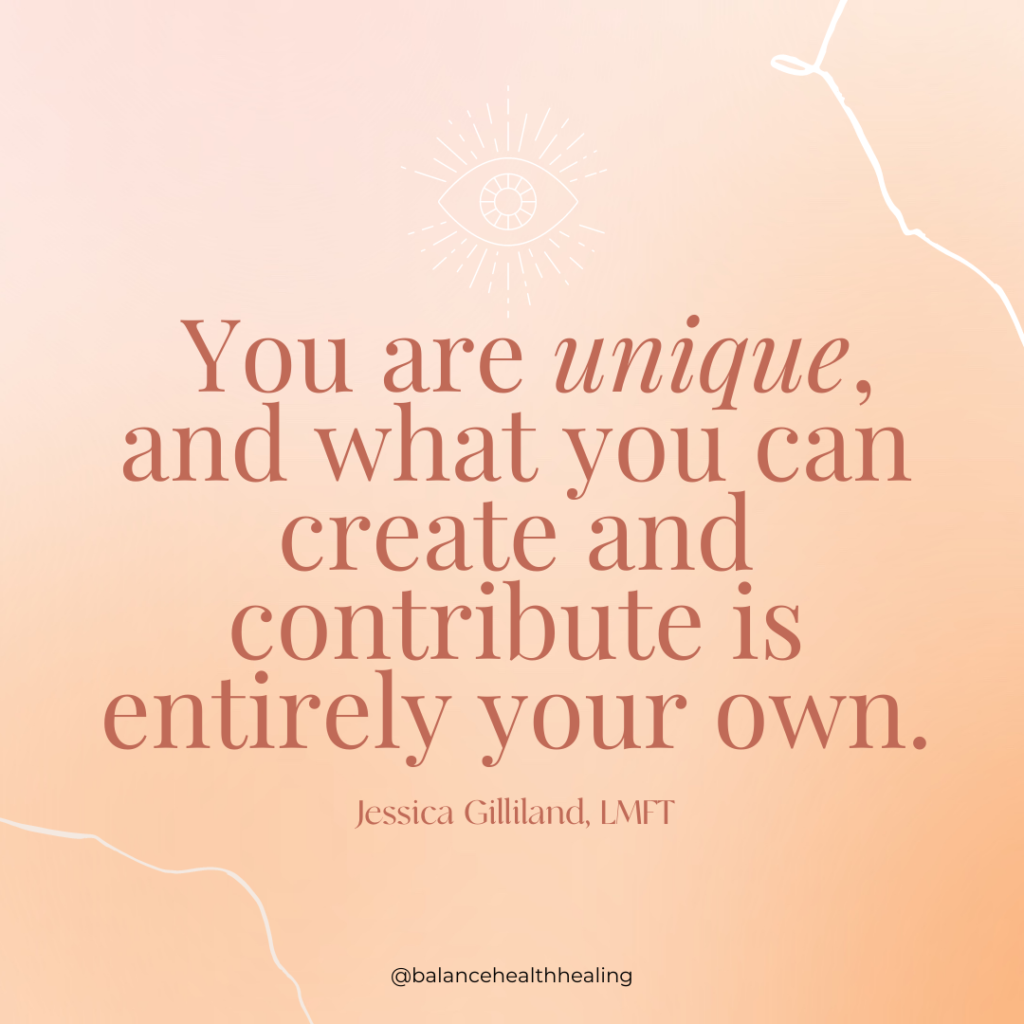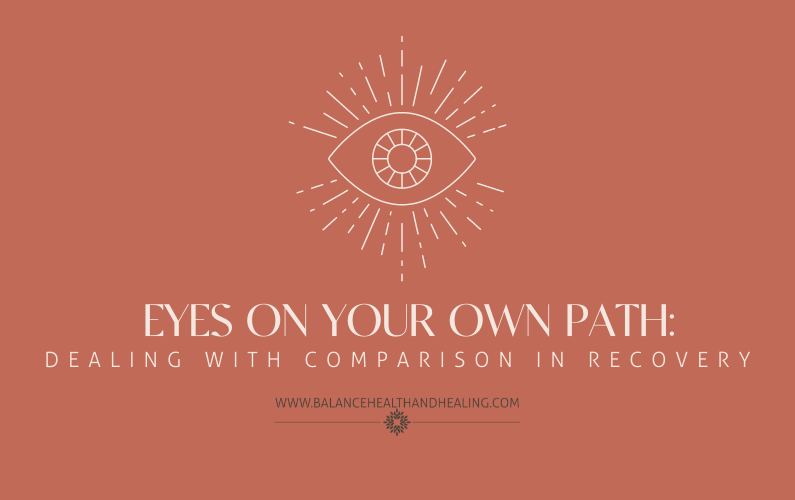Recently I’ve been reading Atlas of the Heart by Dr. Brené Brown. In this book, Brené Brown explores words describing human emotions and experiences and shows how these definitions shape our existence and relationships. When I got to her exploration of the word “comparison,” I knew I had to share it in a blog. She says:
Comparison is the crush of conformity from one side and competition from the other–it’s trying to simultaneously fit in and stand out. Comparison says, “Be like everyone else, but better.”
Wow, right?
 When I read this mic-drop of a definition, I think about how comparison shows up in eating and body image recovery. It shows up in ways that might seem obvious: comparing your body to other peoples’ bodies, comparing what you’re eating to what everyone else is eating, comparing your workout routine to everyone else’s, and on and on. And then there are the comparisons between your current body and your past body–“before and after” pictures, items of clothing that used to fit differently, etc. Comparison can feel motivating at times (for better or for worse), but for most people, the end result of comparison is a sense of inadequacy and exhaustion.
When I read this mic-drop of a definition, I think about how comparison shows up in eating and body image recovery. It shows up in ways that might seem obvious: comparing your body to other peoples’ bodies, comparing what you’re eating to what everyone else is eating, comparing your workout routine to everyone else’s, and on and on. And then there are the comparisons between your current body and your past body–“before and after” pictures, items of clothing that used to fit differently, etc. Comparison can feel motivating at times (for better or for worse), but for most people, the end result of comparison is a sense of inadequacy and exhaustion.
Comparison can also show up in eating recovery in more covert ways. Like Brené Brown says, comparison might whisper in your ear, “Be like everyone else, but better” when it comes to how sick you are. The eating disorder can turn comparison into competition. Comparison might make you feel worthless or invalidated because you are not “sick enough” compared to others, or even to yourself in recovery at different times of your life. Comparison might cause you to look sideways at others’ recovery journeys instead of being able to focus your eyes ahead on your own path. You might find yourself checking the pace of your recovery against someone else’s, and then wondering what’s wrong with you for not moving at the same speed as them.
However it shows up in your recovery process, comparison can end up creating pain on top of pain–an extra layer of suffering on top of the already intense challenges of recovery. And you might be thinking to yourself, “Yeah, I shouldn’t compare myself to others.” And maybe people in your life are saying the same thing: “Don’t compare yourself to others.” And sure, stopping comparison would be great, but HOW?
Here’s my take (and Brené Brown and her research team can back me up on this–check it out in Atlas of the Heart): Don’t expect to be able to just stop comparing yourself to others. Instead, when you find yourself comparing, bring your focus back to your own path. Comparison is almost for sure going to happen to you, and to all of us, automatically, without you really choosing to compare. It’s a mental reflex that is only human. When you notice yourself comparing, it’s up to you to either choose to stay on the path of comparison, or pick another path.
One of the alternative paths to comparison that Brené Brown suggests is CREATIVITY. In her book The Gifts of Imperfection, Brené says, “Creativity, which is the expression of our originality, helps us stay mindful that what we bring to the world is completely original and cannot be compared.” You are unique, and what you can create and contribute is entirely your own.
Living life through comparison is like being a measuring stick–rigid, limited, and in a constant state of calculation. Living life through creativity is like being a paintbrush–flexible, unbounded, and in a state of inventiveness. If you find yourself comparing yourself to others to see how you measure up, keep that image in your mind and turn that measuring stick into a paintbrush and create the life you want for yourself.
a constant state of calculation. Living life through creativity is like being a paintbrush–flexible, unbounded, and in a state of inventiveness. If you find yourself comparing yourself to others to see how you measure up, keep that image in your mind and turn that measuring stick into a paintbrush and create the life you want for yourself.
Another alternative path to comparison: CONNECTION. There are some great thoughts on this alternative in Atlas of the Heart. (Can you tell by now that I want you to go read some Brené Brown?) When you feel the urge to compare or compete with others, think about what it might look like to connect with your own humanity, and the humanity of others. Here are a couple examples that came to my mind when I think of how connection can help you manage comparison:
Comparison says: “She looks so good. I hate my body. I feel disgusting standing next to her.”
Connection says: “She is more than her appearance, and I am more than mine.”
Comparison: “He is so much smarter than me. I’ll never be good enough.”
Connection: “I can appreciate his strengths while honoring and developing my own.”
Comparison: “I am so awkward. Everyone else is so much more confident than me.”
Connection: “It’s human nature to feel self-conscious sometimes. I can be kind to myself when I’m feeling vulnerable.”
If you find yourself struggling with comparison, please remember that it’s nothing to be ashamed of. We’re all bound to compare ourselves to others sometimes. Especially in recovery, comparison will happen. Remember this: you can choose the direction you want to turn when comparison tries to pull you off course. That direction might guide you toward creativity, connection, self-compassion, or some other value you hold close to your heart. When comparison tries to pull your focus sideways towards others’ journeys, turn your eyes forward to look at your own path. That path is where you will find your unique self, the healing you personally need, and the singular, beautiful contributions you can make to the world.

